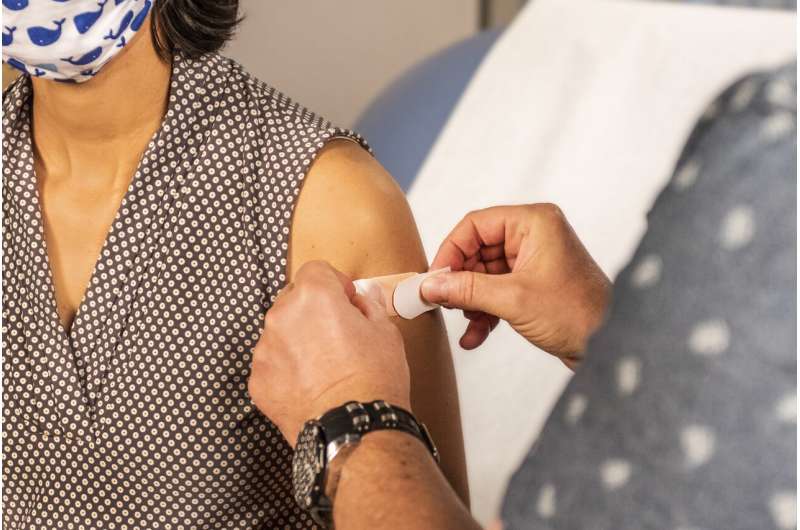This article has been reviewed according to Science X's editorial process and policies. Editors have highlighted the following attributes while ensuring the content's credibility:
fact-checked
reputable news agency
proofread
Less than half of pregnant women get the flu shot: New data from UPMC Children's might change that

John Williams knows the risks associated with riding motorcycles, but they don't deter him. Neither do warnings from physician friends, who hope their chiding might prevent him from becoming a statistic.
In fact, the only force strong enough to keep Williams away from his bike was fatherhood. He "owed it" to his infant to be around, he thought.
As a pediatrician and chief of pediatric infectious diseases at UPMC Children's Hospital of Pittsburgh, he knows that the urge to protect our tiniest babies can be even stronger for mothers.
"Most pregnant women, if you said, 'Hey, if you cut off your left pinky, it will protect your baby,' they'd be like, 'Get out the knife,'" he said. "That baby isn't even here yet, and they'd sacrifice almost anything for it."
But when it comes to protecting themselves—and their babies—from influenza, those habits change.
As with tetanus, diphtheria and pertussis, and COVID-19 vaccines, antibodies created in the mother's body by the influenza vaccine can cross the placenta and confer protection to the baby. As a result, flu shots have been recommended globally to the pregnant population by the World Health Organization since 2012.
Despite these advantages, fewer and fewer pregnant women are receiving the flu vaccine.
As of the end of November 2023, 16.7% fewer pregnant women had received the influenza vaccine compared to November 2019—33.8% versus 50.5%—according to the Centers for Disease Control and Prevention. This amid Allegheny County's current spike in flu cases and a similar trend statewide that has already caused 31 influenza-related deaths this season.
"Mothers don't think of it—and OBs don't present it—as protecting the baby," Williams said, noting that influenza during pregnancy carries risks such as preterm birth, small-for-gestational-age infants and fetal loss, in addition to maternal risks such as hospitalization and death.
As part of a 20-year-long CDC surveillance study, to which UPMC Children's was invited in 2016, Williams and his colleagues seek to adjust that narrative with research published in the Journal of the American Medical Association Pediatrics.
Following nearly 3,800 infants, they quantified how effective maternal influenza vaccination is in preventing flu-related hospitalizations and emergency department visits for children younger than 6 months, the age when infants are eligible for their own influenza vaccines.
Of the 2,007 infants born to vaccinated mothers, 223 contracted influenza. Infant protection conferred via maternal vaccination showed 39% effectiveness against infant hospitalization and 19% effectiveness against infant emergency department visits.
That protection is even greater for the smallest patients, as the overall effectiveness of maternal vaccination climbs to 53% when looking at infants younger than 3 months.
As nature would have it, there's synchronicity to the timing of these vaccines.
The Williams research team found influenza vaccines to be most effective in protecting infants when administered during the third trimester, which is also when the highest rates of influenza-related hospitalizations among pregnant women are observed.
The extra risk for pregnant women during flu season, especially during their third trimesters, is twofold, Williams said.
First, pregnant women are immunocompromised—their immune systems are on a slight break—as a way to protect the developing baby. Otherwise, the body could view this new being as an invader worth attacking.
The downside of that phenomenon is moms having fewer weapons to fight actual invaders, like the flu.
Second, even in healthy, influenza-free moms, the third trimester is accompanied by long, slow, non-romantic walks up the stairs as the growing baby impinges on space usually occupied by expanding lungs.
Anything that impairs the lungs' ability to fully inflate is a risk for pneumonia (or worsening upper-respiratory symptoms).
Because those causes are unalterable aspects of pregnancy, physicians like Williams are determined to increase the uptake of influenza vaccine among the pregnant population in a different way: open, honest conversation.
"We certainly have seen more hesitancy since COVID-19 where people question vaccination," Williams said. "In the medical profession, we welcome questions. I would love to give you facts about the vaccines.
"Flu vaccines, for instance, are entirely, entirely safe. It's one of the safest vaccines known. It's virtually unchanged for 50 years. We have decades of experience with it in hundreds of millions of patients."
He hopes the data published by his team last month can serve as educational ammunition toward broadening moms' understanding of the influenza vaccine's purpose—to include their developing babies—which could translate into more pregnant women choosing to get the flu shot.
And he calls on new babies' family members to join the cause, as his own story of hanging up his hog now becomes a parable for how to support young families.
"The best way to protect our very young children and infants is for everyone around them to be vaccinated. We call that cocooning," he said. "Even if people feel like, 'I'm willing to take my chances,' are you willing to take chances with the baby, or do you want to protect them?"
2024 the Pittsburgh Post-Gazette. Distributed by Tribune Content Agency, LLC.



















